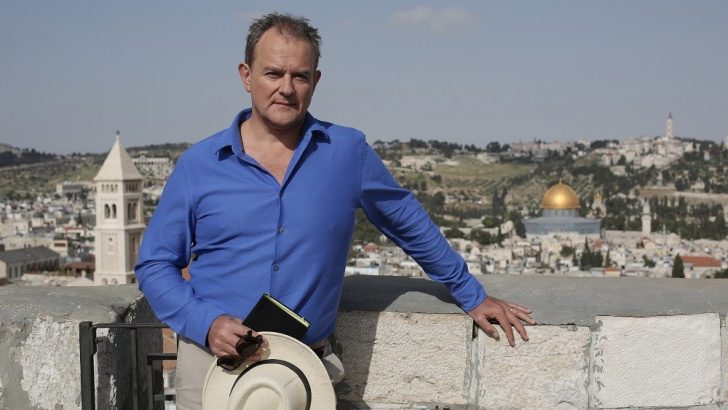A one-off RTÉ programme seeks to bring the Passion of Christ to life, writes Michael Kelly
Actor Hugh Bonneville is perhaps best known for his role as Lord Grantham in the hit British series Downton Abbey. What people may not know, however, is that he studied theology at Cambridge University and has always had a particular interest in the Gospel accounts of the life and passion of Christ.
Now, he seeks to bring the Gospel to life in a special one-off programme to be broadcast on RTÉ One television on Easter Sunday. He travels to Jerusalem to examine the events, characters and context of the last week of Jesus’ life: six tumultuous days that gave rise to a faith now followed by nearly a third of the world’s population.
For Mr Bonneville: “Jerusalem is a place where history and religion come together.” He believes that “whether you are a person of faith or of none, you cannot escape the fact that the last six days of this man’s life, and his death, changed the world.
“I’m not going to chart the religion that grew out of these events. I’m interested in the events themselves: what happened in that final week of Jesus’ life, how he died, why he died and who killed him,” he insists.
Experts
With the help of some of the world’s leading academic experts, Mr Bonneville explains why, 2,000 years ago, the arrival in Jerusalem, of a Jewish healer and preacher from Nazareth was so incendiary that the most powerful people in the land wanted him silenced – and fast.
Against the ticking clock of a six-day ‘Countdown to Calvary’, Bonneville uses all the latest television narrative tools – high quality location drama, computer-generated imagery, motion control, slow-motion panoramas and his own sleeves-rolled-up sleuthing – to bring that story to life. But, according to those behind the production, this isn’t a dusty religious tale, it’s a pulsating political thriller, full of power struggles, conspiracies and betrayal.
He sets out to discover why, in an era when the Romans crucified as many as 500 people in a day, this one brutal execution had such a seismic and lasting impact.
The story of the days leading up to that first Easter have reached us principally through the Christian Gospels of Matthew, Mark, Luke and John. As vital as these accounts are to understanding the events, there are also other sources of information, including contemporary written accounts and artefacts, still visible in the ancient streets and stones of Jerusalem. Sifting all this evidence, Bonneville makes some startling discoveries:
- Pontius Pilate, the Roman Governor, whom the Bible portrays as Jesus’ reluctant and sensitive judge, is revealed in other contemporary sources as a heartless brute with zero tolerance for anyone who might challenge Jerusalem’s fragile political stability.
- The Chief Priest, Caiaphas, and the religious elite, who ran Jerusalem’s Temple and were expected to keep the peace, would have feared the Roman backlash that a charismatic figure like Jesus might stir up in the feverish atmosphere of Jerusalem during Passover. However, the Jewish trial of Jesus, as portrayed in the Gospels, would have been against their own religious law. So, did it even happen, or are the Gospel accounts a deliberate attempt to frame the Jews as ‘Christ-killers’? If so, why?
- The world knows Judas as history’s most famous traitor, but this is not always how he is described in the original Greek Gospels, as Bonneville reminds us. He goes on to examine arguments for the rehabilitation of Judas: that he may in fact have been trying to save Jesus by negotiating with the Jewish authorities, or that Judas’ role in the Passion narrative was a necessary evil and, as such, part of Jesus’ divinely ordained mission.
What Christians regard as the original Holy Week shaped a faith now practised by 2.2 billion people. But that week has also left a bitter legacy, giving rise to centuries of anti-Semitism and persecution. It’s partly this contradiction that fuels Hugh Bonneville’s curiosity, as he pieces together the Passion jigsaw with rigour, intelligence and wit, offering viewers of all faiths and none compelling new insights into this ancient story.
Countdown to Calvary is an RTÉ production, co-produced with ARTE and American Public Television (APT). It airs on RTÉ One, Easter Sunday (April 1, 2018) at 8pm.


 Michael Kelly
Michael Kelly Hugh Bonneville with the Dome of the Rock in Jerusalem in the distance
Hugh Bonneville with the Dome of the Rock in Jerusalem in the distance 